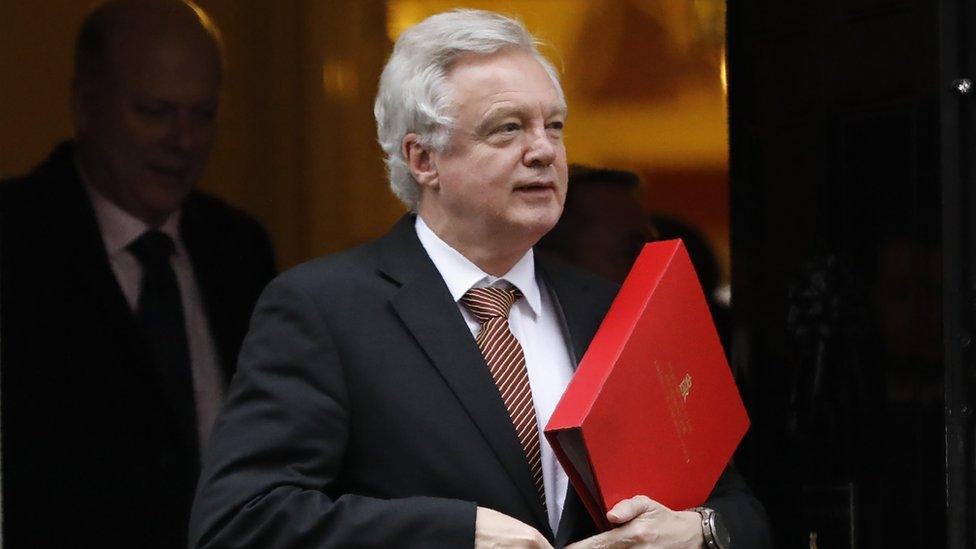David Davis to set out EU transition hopes
- Published
- comments

Brexit Secretary David Davis is to deliver a speech on the transitional arrangements the UK hopes to negotiate with the EU after it leaves.
This relates to the time-limited period that will come after Brexit day but before the final relationship kicks in.
The BBC understands Mr Davis will say on Friday that the UK wants to be free to negotiate and agree trade deals with other countries during this period.
These could then be signed as soon as the transition period ends.
He is also expected to say the UK wants to stay in the EU's existing trade deals with other countries - although there is no guarantee Brussels will agree.
The UK is due to leave the EU in March 2019.
Negotiations have yet to start on what the final relationship will look like between the UK and the EU, including how trade will work across the borders.

Questions for Davis to answer
BBC political editor Laura Kuenssberg
David Davis v Jacob Rees-Mogg on Brexit transition
The PM has already made clear that we will broadly accept the existing rules and regulations, and ministers agree that although we will officially be outside the Single Market free trade area and the Customs Union, we'll replicate those arrangements so that industry isn't dealing with dramatic overnight change.
But the more precise nature of the period between 2019 and 2021 is not that clear. And there is brewing anxiety among Theresa May's Brexiteer base that what was billed originally as an implementation phase, where we move from one system to another, will be more like two years stuck in aspic.
That's why the new leader of the influential European Research Group of Tories, Jacob Rees-Mogg, so delighted in taunting David Davis in front of the Brexit committee yesterday, claiming that during that time the UK will be a "vassal state".
So tomorrow, Mr Davis will have questions to answer. I'm told that he will make clear the UK intends to negotiate and complete trade deals with other countries during the transition, to be ready to sign on the dotted line the moment the transition is over.
He's also expected to make plain the UK wants to remain within existing agreements that the EU has stitched together with other countries too.

Both sides have spoken about a transition period - called an "implementation phase" by the UK government - to avoid a "cliff edge" scenario for businesses on the day the UK officially leaves the EU.
The UK hopes to agree terms for this temporary period to be agreed with the EU by the end of March, so talks can focus on the permanent post-Brexit relationship.
Earlier this month the EU's draft guidelines for the transition phase were revealed. Among the things they call for are the continued free movement of EU citizens, and for the UK to require the EU's permission to roll over trade agreements with third countries.
On Wednesday Mr Davis told MPs the transition period would not be a "deferral" of Brexit, even though the UK will still be following European court rules.
Some Eurosceptic MPs have expressed concern that this means the UK will not be properly leaving the EU in March 2019.
But Brexit campaigner and former Tory minister Theresa Villiers told the BBC she would, "with caution" support a temporary arrangement which stayed close to the status quo because of the need to "listen to businesses".
In a legal sense the UK would still be leaving, but most of the changes would not come for another two years, she said.
Mr Davis favours a transition period of between 21 and 28 months, while the EU's chief negotiator Michel Barnier has suggested it should not last beyond December 2020 - 21 months after the UK is due to leave.